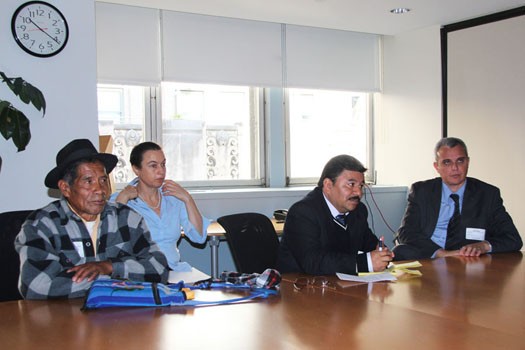The genocide case against Guatemalan former general and de-facto head of state Efraín Ríos Montt recently took on a new international dimension.
On November 6th, lawyers of the victims in the case filed a petition before the Inter-American Commission on Human Rights to condemn the state of Guatemala for the impunity for crimes of genocide and crimes against humanity committed against the Ixil people.
In May 2013, Ríos Montt was originally found guilty by national courts of genocide, based on broad evidence, including the massacre of 1,771 members of the Mayan Ixil people during Guatemala’s civil war in the 1980s. However, 11 days later the decision was overturned by the Constitutional Court, in a ruling which effectively means the case will have to be retried. Human rights organization CALDH and victims’ organization AJR, who represented more than 100 victims and their families at the trial, insist that the Constitutional Court’s decision is illegal.
In this new effort to ensure justice for the victims, Francisco Soto (CALDH) and Edgar Garcia (AJR) visited ICTJ’s headquarters in New York on November 5th. During the informative session, they shared their concerns about the ability of the Guatemalan judiciary to ensure that human rights violations from the armed conflict are duly addressed.
On the same day, a Guatemalan court announced that the Rios Montt trial will resume in January 2015, well more than a year from now. “What certainty do victims have that the Guatemalan courts will respect the due process of law this time? If they annulled the verdict once, they can do it again,” Soto said.
The Ríos Mont case has shown that “impunity reigns and judicial independence is being violated,” added Pérez. He underscored that “there’s been threats to witnesses, judges, prosecutors and other procedural parties.”
Accompanying the human rights lawyer was Tiburcio Utuy, an Ixil survivor who testified at the Rios Montt trial. “We were so glad and grateful when the verdict was issued, after all the hard work done by the lawyers. But unfortunately they annulled it, and it is clear that there’s no guarantee of justice in Guatemala.”
| This is why CLADH and AJR are now taking the case to the Inter-American Commission on Human Rights. “We hope for the Inter-American system to supervise more directly the Guatemalan judicial process,” Soto explained. |
|
In addition to the Rios Montt case, the human rights lawyers are concerned about the fact that the justice system in Guatemala could be at risk. In the coming year, many key justice system authorities will be named, including the attorney general, members of the Supreme Court, and all appeals chambers. “The work of the Public Ministry, and especially Dr. Claudia Paz y Paz as the current attorney general, has been key in moving this case forward,” Soto explained, yet they are not confident about who will come next, after the disappointing decisions coming from the Constitutional Court. “International support is vital during these important changes,” Soto stressed, and suggested that observation missions be created to oversee the appointments made to the Guatemalan judiciary.
“The verdict in the genocide trial was historic, the result of enormous efforts and the slow reform of Guatemala’s justice institutions. But the Constitutional Courts decision to overturn it reflects a backlash from the country´s most conservative forces, and threatens to turn back the clock on judicial independence," said Marcie Mersky, ICTJ’s Program Office Director. "After the enormous struggle led by victims like Tiburcio Utuy and brave human rights advocates like Francisco Soto and Edgar Pérez, the international community needs to closely monitor the coming developments in the judiciary and give support to those working to ensure its independence."
Francisco Soto and Edgar Pérez have a long history of fighting for justice for victims of crimes against humanity and war crimes committed during Guatemala's internal armed conflict. For 13 years they have been documenting the violations and building the case that brought Ríos Montt to trial.
The human rights lawyers say they will keep fighting for justice, despite the daunting expectations. Pérez hopes that the additional international pressure will act as a catalyst for effectively addressing the crimes committed against the Ixil and other communities. “It’s a strategic game. A game of time,” Pérez said. “We will continue with the Inter-American process until the end,” Soto added.
*PHOTO: (From left to right): Tiburcio Utuy, member of the Ixil community, Edgar Pérez, lawyer of AJR, y Francisco Soto, Executive Director of CALDH, speak in the New York offices of ICTJ on November 5, 2013. (ICTJ)*
